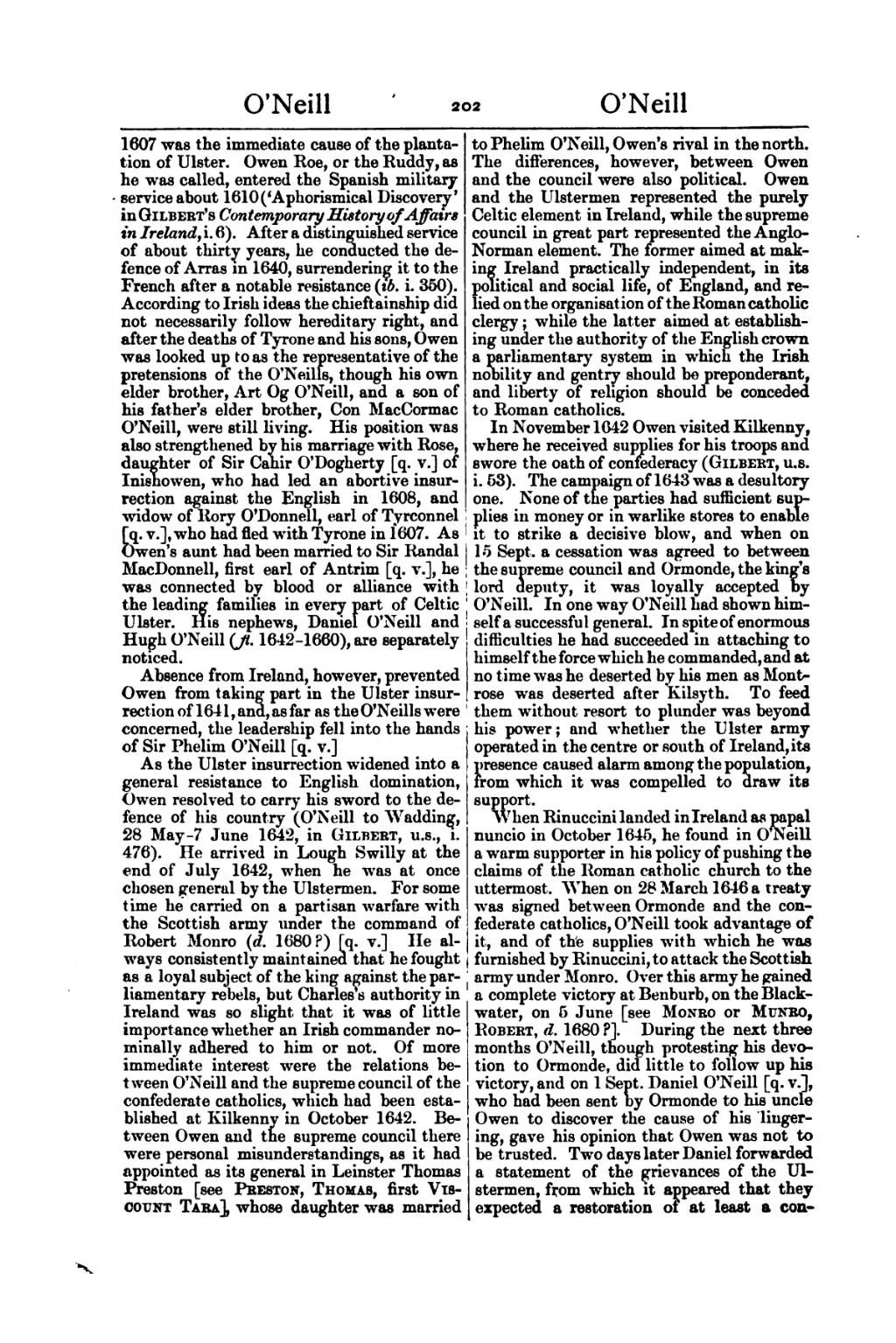1607 was the immediate cause of the plantation of Ulster. Owen Roe, or the Ruddy, as he was called, entered the Spanish military service about 1610 (‘Aphorismical Discovery’ in Gilbert's Contemporary History of Affairs in Ireland, i. 6). After a distinguished service of about thirty years, he conducted the defence of Arras in 1640, surrendering it to the French after a notable resistance (ib. i. 350). According to Irish ideas the chieftainship did not necessarily follow hereditary right, and after the deaths of Tyrone and his sons, Owen was looked up to as the representative of the pretensions of the O'Neills, though his own elder brother, Art Og O'Neill, and a son of his father's elder brother, Con MacCormac O'Neill, were still living. His position was also strengthened by his marriage with Rose, daughter of Sir Cahir O'Dogherty [q. v.] of Inishowen, who had led an abortive insurrection against the English in 1608, and widow of Rory O'Donnell, earl of Tyrconnel [q. v.], who had fled with Tyrone in 1607. As Owen's aunt had been married to Sir Randal MacDonnell, first earl of Antrim [q. v.], he was connected by blood or alliance with the leading families in every part of Celtic Ulster. His nephews, Daniel O'Neill [q. v.] and Hugh O'Neill (fl. 1642–1660) [q. v.], are separately noticed.
Absence from Ireland, however, prevented Owen from taking part in the Ulster insurrection of 1641, and, as far as the O'Neills were concerned, the leadership fell into the hands of Sir Phelim O'Neill [q. v.]
As the Ulster insurrection widened into a general resistance to English domination, Owen resolved to carry his sword to the defence of his country (O'Neill to Wadding, 28 May–7 June 1642, in Gilbert, u.s., i. 476). He arrived in Lough Swilly at the end of July 1642, when he was at once chosen general by the Ulstermen. For some time he carried on a partisan warfare with the Scottish army under the command of Robert Monro (d. 1680?) [q. v.] He always consistently maintained that he fought as a loyal subject of the king against the parliamentary rebels, but Charles's authority in Ireland was so slight that it was of little importance whether an Irish commander nominally adhered to him or not. Of more immediate interest were the relations between O'Neill and the supreme council of the confederate catholics, which had been established at Kilkenny in October 1642. Between Owen and the supreme council there were personal misunderstandings, as it had appointed as its general in Leinster Thomas Preston [see Preston, Thomas, first Viscount Tara], whose daughter was married to Phelim O'Neill, Owen's rival in the north. The differences, however, between Owen and the council were also political. Owen and the Ulstermen represented the purely Celtic element in Ireland, while the supreme council in great part represented the Anglo-Norman element. The former aimed at making Ireland practically independent, in its political and social life, of England, and relied on the organisation of the Roman catholic clergy; while the latter aimed at establishing under the authority of the English crown a parliamentary system in which the Irish nobility and gentry should be preponderant, and liberty of religion should be conceded to Roman catholics.
In November 1642 Owen visited Kilkenny, where he received supplies for his troops and swore the oath of confederacy (GILBERT, u.s. i. 53). The campaign of 1643 was a desultory one. None of the parties had sufficient supplies in money or in warlike stores to enable it to strike a decisive blow, and when on 15 Sept. a cessation was agreed to between the supreme council and Ormonde, the king's lord deputy, it was loyally accepted by O'Neill. In one way O'Neill had shown himself a successful general. In spite of enormous difficulties he had succeeded in attaching to himself the force which he commanded, and at no time was he deserted by his men as Montrose was deserted after Kilsyth. To feed them without resort to plunder was beyond his power; and whether the Ulster army operated in the centre or south of Ireland, its presence caused alarm among the population, from which it was compelled to draw its support.
When Rinuccini landed in Ireland as papal nuncio in October 1645, he found in O'Neill a warm supporter in his policy of pushing the claims of the Roman catholic church to the uttermost. When on 28 March 1646 a treaty was signed between Ormonde and the confederate catholics, O'Neill took advantage of it, and of the supplies with which he was furnished by Rinuccini, to attack the Scottish army under Monro. Over this army he gained a complete victory at Benburb, on the Blackwater, on 5 June [see Monro or Munro, Robert, d. 1680?]. During the next three months O'Neill, though protesting his devotion to Ormonde, did little to follow up his victory, and on 1 Sept. Daniel O'Neill [q. v.], who had been sent by Ormonde to his uncle Owen to discover the cause of his lingering, gave his opinion that Owen was not to be trusted. Two days later Daniel forwarded a statement of the grievances of the Ulstermen, from which it appeared that they expected a restoration of at least a con-
